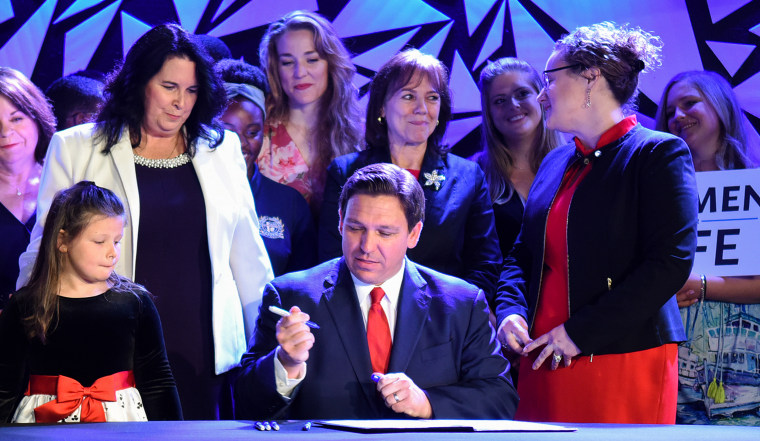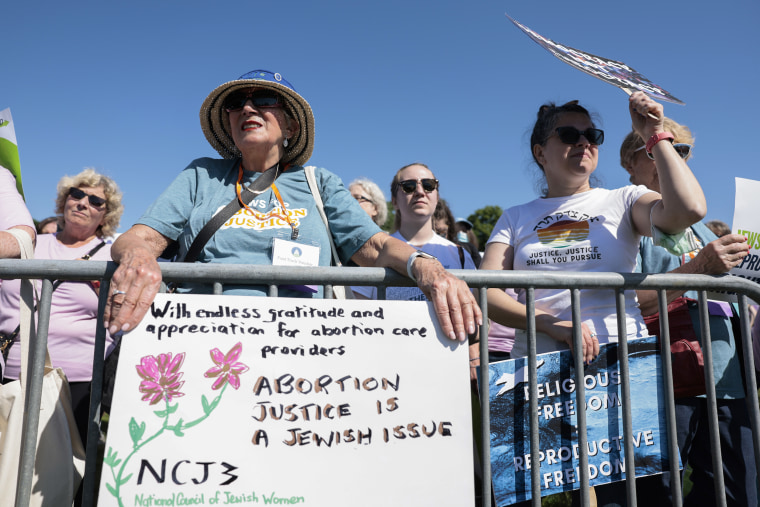The Supreme Court decision reversing Roe v. Wade answered the prayers of conservative Christians across the U.S. who rallied against the landmark 1973 ruling for nearly half a century. But many American Jews are dismayed, and some Jewish leaders view restrictions on reproductive rights as an attack on religious liberty.
In statements following the release of Dobbs v. Jackson Women's Health Organization, the ruling that overruled Roe, organizations such as the American Jewish Committee, the Anti-Defamation League, Hillel International and the Women's Rabbinic Network expressed deep anguish.
"In this moment, our feelings are best embodied by Numbers 11:10: 'God became exceedingly angry; and Moses despaired.' ... We stand with generations of Jewish scholars who state clearly and unequivocally that abortion access is a Jewish value," the Women’s Rabbinic Network said.
The decision to sweep away Roe and about 50 years of legal precedent, the group went on to say, "must be understood as a violation of the United States Constitution which guarantees our freedom to practice our religion and also our freedom from the dictates of other religions."
In the eyes of many Jewish leaders, anti-abortion laws are particularly distressing because they contradict Jewish halakha — the laws drawn from the Torah, the Mishnah and the Talmud, the most sacred and authoritative texts in the tradition — according to Rabbi Ed Feinstein of Valley Beth Shalom synagogue in Los Angeles.
Feinstein cited several passages from Jewish scripture that have grounded the religion's position on reproductive rights in the modern era, such as a line from the Judaic oral tradition stating that the life of a "woman who is having difficulty in giving birth" must "take precedence."
He said the reasoning undergirding anti-abortion legislation in some conservative-skewing states typically comes out of conservative Christian theology — ignoring the Jewish principle that a fetus in the womb has "potential" but not the status of full personhood.
"The idea that life begins at conception is a philosophical idea, and the source of that idea is a religious source: Catholic and evangelical interpretation of scripture," Feinstein said. "But our tradition has a different idea, that full life begins at birth, and there is a different moral standard.
"It's another example of where a particular religion's perception of the world has taken hold of American culture," Feinstein added.
The question of religious liberty, a term usually associated with the Christian right, looms over anti-abortion legislation slated to become law in Florida under Gov. Ron DeSantis, a Republican who is widely expected to run for the GOP presidential nomination in 2024.

In a lawsuit filed earlier this month, Congregation L'Dor Va-Dor, a progressive synagogue in Palm Beach County, challenged legislation that bans most abortions after 15 weeks, arguing that it violates the state constitution's privacy protections as well as the tenet of freedom of religion. The law is supposed to take effect July 1.
In the Jewish legal tradition, the suit says, "abortion is required if necessary to protect the health, mental or physical well-being of the woman."
DeSantis’ office did not immediately respond to a voicemail and email from NBC News requesting comment on the lawsuit. However, in an email to Reuters earlier this month about the legal challenge, the governor’s office said it was “confident that this law will ultimately withstand all legal challenges.”
In an interview with NBC News on Monday, Congregation L’Dor Va-Dor Rabbi Barry Silver — a former Democratic member of the Florida House of Representatives and an attorney — said his temple's lawsuit has taken on greater urgency since Roe was overturned and blasted the Dobbs decision, calling it "irrational."
"The ruling criminalizes the practice of Judaism," Silver said, referring to Dobbs, "because the law regarding abortion is different for Jews than it is for fundamentalist Christians."
The American Jewish community has traditionally supported abortion access in overwhelming numbers.
In a 2014 survey, Pew Research Center found that 83% of more than 800 Jews surveyed said abortion should be legal in most or all cases. Seventy-five percent of Jews polled by the 2022 National Survey of Jewish Voters said they were concerned the Supreme Court would toss out Roe.
In general, Judaism's Reform and Conservative movements tend to take more liberal positions on social issues in American life. But the picture is more complex among those who practice Orthodox Judaism, whose adherents tend to be more politically conservative and Republican-leaning than other Jews, according to Pew.
In a statement, the Orthodox Union, the most prominent national organization representing the Orthodox branch of Judaism, said it was "unable to either mourn or celebrate the U.S. Supreme Court's overturning of Roe v. Wade."
"We cannot support absolute bans on abortion—at any time point in a pregnancy—that would not allow access to abortion in lifesaving situations," the organization said. "Similarly, we cannot support legislation that does not limit abortion to situations in which medical (including mental health) professionals affirm that carrying the pregnancy to term poses real risk to the life of the mother."
Rabbi Moshe Hauer, the executive vice president of the Orthodox Union and the rabbi emeritus at a synagogue in Baltimore, said in an interview he would welcome a "shift" in American culture from a "focus on rights to a focus on responsibilities" when it comes to issues of life and death.
Agudath Israel of America, an organization that represents strictly Orthodox (or "ultra-Orthodox") Haredi Jews, commended the Supreme Court, saying in a tweet that it "welcomes" the end of Roe v. Wade.
"We pray that today’s ruling will inspire all Americans to appreciate the moral magnitude of the abortion issue," the organization tweeted Friday, "and to embrace a culture that celebrates life."
In a message to congregants, the clergy at Temple Sinai in Atlanta attempted to capture the interdenominational nuances, writing in part: "While our different streams of Judaism may differ in their parameters for permitting abortion, a blanket denial of access to abortion would be in opposition to Jewish values."
Feinstein, the rabbi from California, said many Jewish leaders are concerned that the conservatives on the Supreme Court will now work to overrule same-sex marriage, a right established by the Obergefell v. Hodges decision in 2015. (In a concurring opinion to Dobbs, Justice Clarence Thomas asked the court to "reconsider" that precedent.)
"We, as Jews, can feel something in the air," Feinstein said. "When people start losing their rights, we sense the danger that comes with that."

